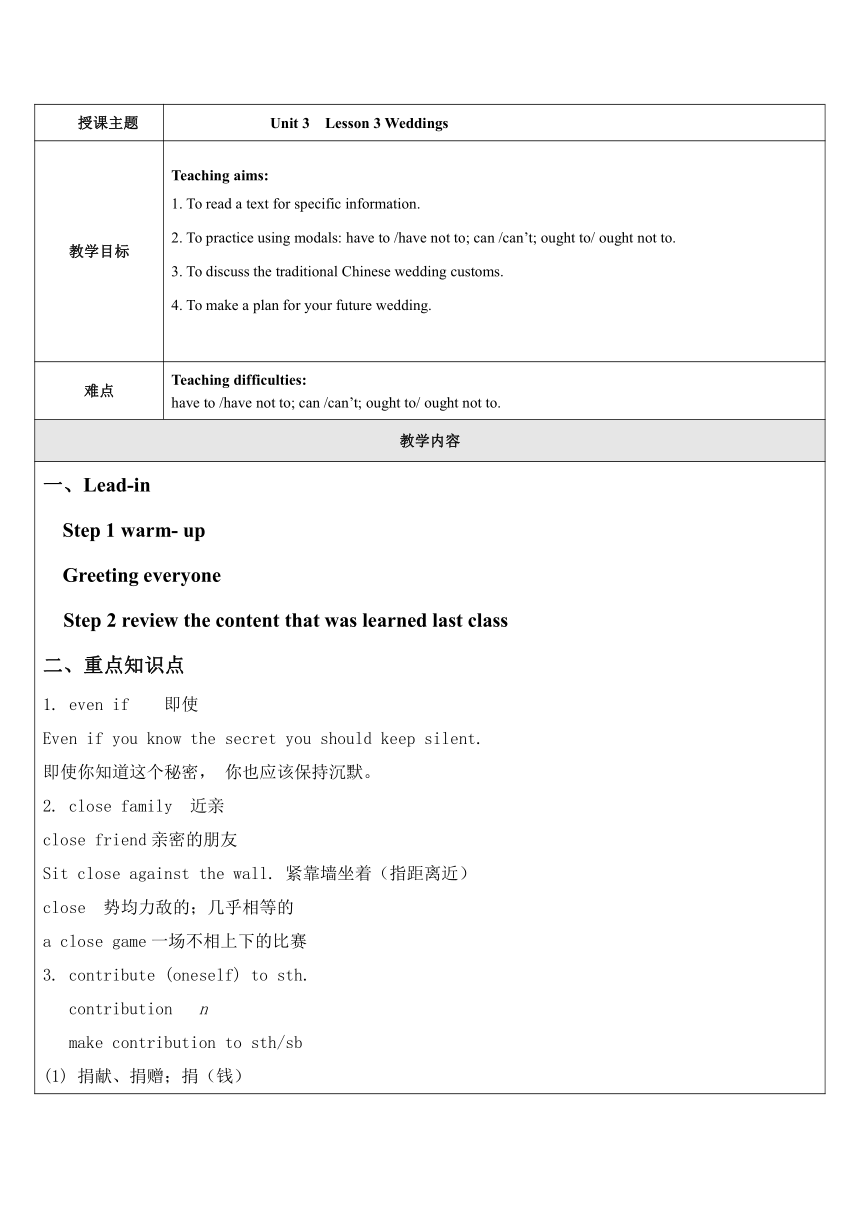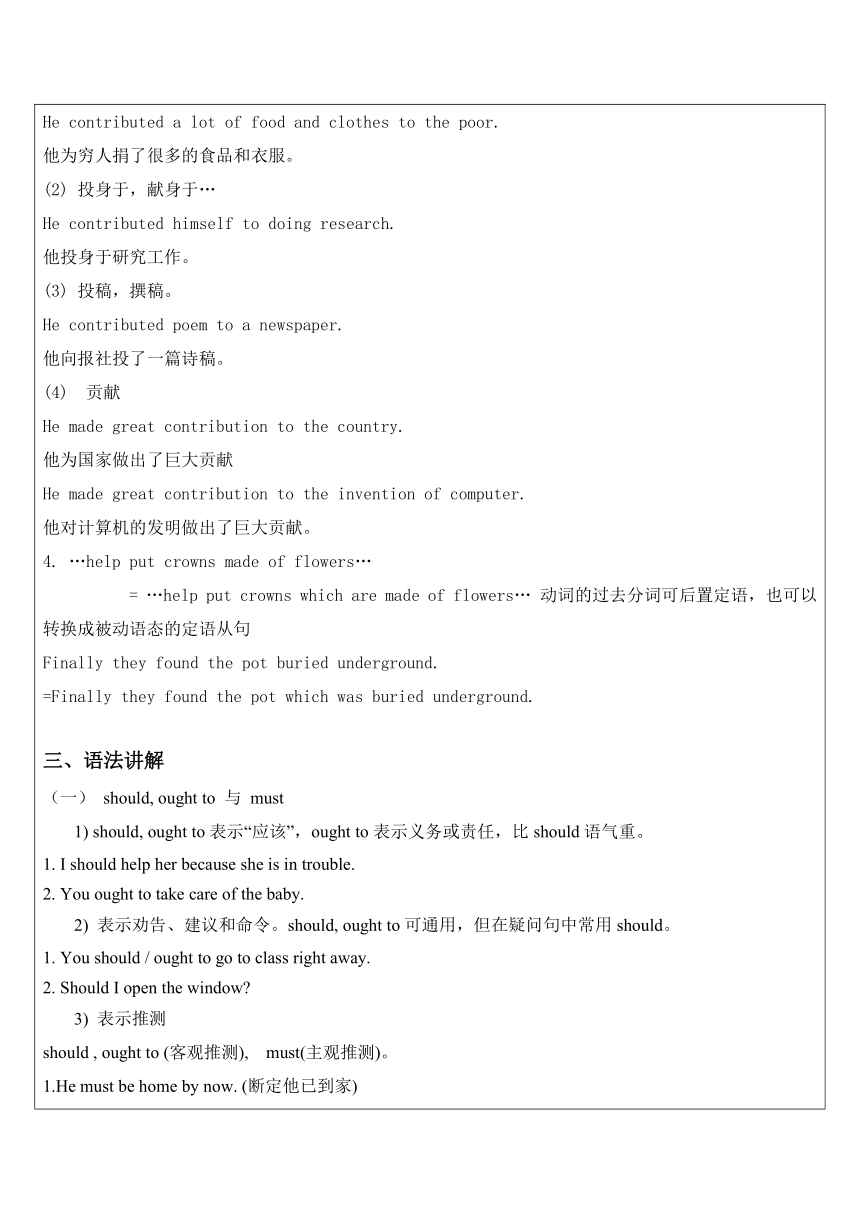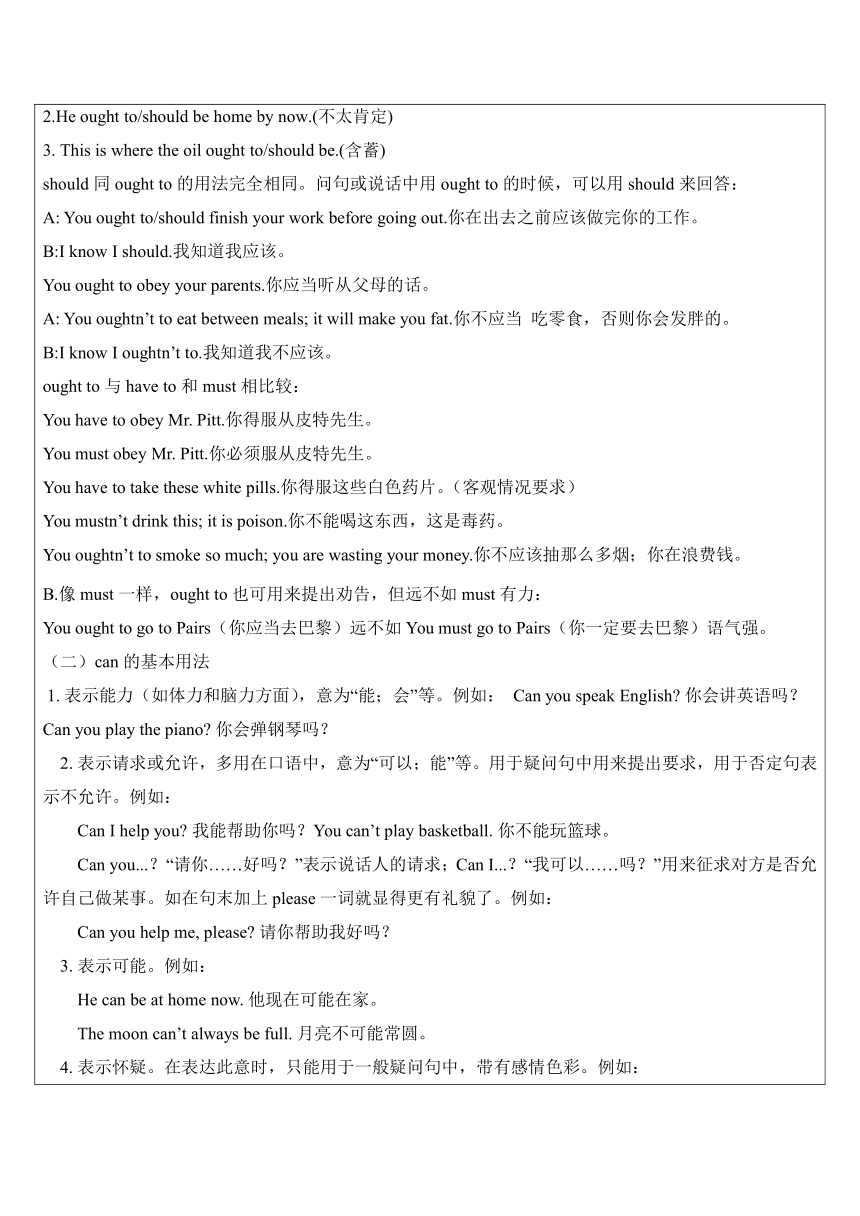高中英语北师大版必修一Unit 3 Celebration Lesson3同步教案(表格式)
文档属性
| 名称 | 高中英语北师大版必修一Unit 3 Celebration Lesson3同步教案(表格式) |

|
|
| 格式 | zip | ||
| 文件大小 | 24.9KB | ||
| 资源类型 | 教案 | ||
| 版本资源 | 北师大版 | ||
| 科目 | 英语 | ||
| 更新时间 | 2022-01-15 18:52:39 | ||
图片预览



文档简介
授课主题 Unit 3 Lesson 3 Weddings
教学目标 Teaching aims: 1. To read a text for specific information. 2. To practice using modals: have to /have not to; can /can’t; ought to/ ought not to. 3. To discuss the traditional Chinese wedding customs. 4. To make a plan for your future wedding.
难点 Teaching difficulties: have to /have not to; can /can’t; ought to/ ought not to.
教学内容
一、Lead-in Step 1 warm- up Greeting everyone Step 2 review the content that was learned last class 二、重点知识点 1. even if 即使 Even if you know the secret you should keep silent. 即使你知道这个秘密, 你也应该保持沉默。 2. close family 近亲 close friend亲密的朋友 Sit close against the wall. 紧靠墙坐着(指距离近) close 势均力敌的;几乎相等的 a close game一场不相上下的比赛 3. contribute (oneself) to sth. contribution n make contribution to sth/sb (1) 捐献、捐赠;捐(钱) He contributed a lot of food and clothes to the poor. 他为穷人捐了很多的食品和衣服。 (2) 投身于,献身于… He contributed himself to doing research. 他投身于研究工作。 (3) 投稿,撰稿。 He contributed poem to a newspaper. 他向报社投了一篇诗稿。 (4) 贡献 He made great contribution to the country. 他为国家做出了巨大贡献 He made great contribution to the invention of computer. 他对计算机的发明做出了巨大贡献。 4. …help put crowns made of flowers… = …help put crowns which are made of flowers… 动词的过去分词可后置定语,也可以转换成被动语态的定语从句 Finally they found the pot buried underground. =Finally they found the pot which was buried underground. 语法讲解 (一) should, ought to 与 must 1) should, ought to表示“应该”,ought to表示义务或责任,比should语气重。 1. I should help her because she is in trouble. 2. You ought to take care of the baby. 2) 表示劝告、建议和命令。should, ought to可通用,但在疑问句中常用should。 1. You should / ought to go to class right away. 2. Should I open the window 3) 表示推测 should , ought to (客观推测), must(主观推测)。 1.He must be home by now. (断定他已到家) 2.He ought to/should be home by now.(不太肯定) 3. This is where the oil ought to/should be.(含蓄) should同ought to的用法完全相同。问句或说话中用ought to的时候,可以用should来回答: A: You ought to/should finish your work before going out.你在出去之前应该做完你的工作。 B:I know I should.我知道我应该。 You ought to obey your parents.你应当听从父母的话。 A: You oughtn’t to eat between meals; it will make you fat.你不应当 吃零食,否则你会发胖的。 B:I know I oughtn’t to.我知道我不应该。 ought to与have to和must相比较: You have to obey Mr. Pitt.你得服从皮特先生。 You must obey Mr. Pitt.你必须服从皮特先生。 You have to take these white pills.你得服这些白色药片。(客观情况要求) You mustn’t drink this; it is poison.你不能喝这东西,这是毒药。 You oughtn’t to smoke so much; you are wasting your money.你不应该抽那么多烟;你在浪费钱。 B.像must一样,ought to也可用来提出劝告,但远不如must有力: You ought to go to Pairs(你应当去巴黎)远不如You must go to Pairs(你一定要去巴黎)语气强。 (二)can的基本用法 1. 表示能力(如体力和脑力方面),意为“能;会”等。例如: Can you speak English 你会讲英语吗? Can you play the piano 你会弹钢琴吗? 2. 表示请求或允许,多用在口语中,意为“可以;能”等。用于疑问句中用来提出要求,用于否定句表示不允许。例如: Can I help you 我能帮助你吗?You can’t play basketball. 你不能玩篮球。 Can you...?“请你……好吗?”表示说话人的请求;Can I...?“我可以……吗?”用来征求对方是否允许自己做某事。如在句末加上 please一词就显得更有礼貌了。例如: Can you help me, please 请你帮助我好吗? 3. 表示可能。例如: He can be at home now. 他现在可能在家。 The moon can’t always be full. 月亮不可能常圆。 4. 表示怀疑。在表达此意时,只能用于一般疑问句中,带有感彩。例如: Can it be true 那会是真的吗? 5、 can的句式变化如下: (1). 在变否定句时,直接在can后加上“not”,可缩写成can’t或cannot, 但不能写成cann’t。例如: He can swim. → He can’t swim. Emma can see the pen on the desk.→ Emma cannot see the pen on the desk. (2). 在变一般疑问句时,把can直接移到主语前(原主语的首字母改成小写,第一人称应变为第二人称)即可。例如: I can see an orange on the table. → Can you see an orange on the table 其回答可用Yes, OK或Certainly等作肯定回答;用No或Sorry等作否定回答。例如: —Can you look after my books, please 你能照看一下我的书吗? —OK. 可以。 用Certainly回答。此时语气更为肯定。例如: —Can I see your guitar 我能看看你的吉它吗? —Certainly. 当然可以。 [特别提醒] can与may都可以表示“许可”。在征求对方意见时用may较多。例如:May I go now 现在我可以走吗?在询问客观上是否可以时,can则当仁不让。例如:Can we take the books out 我们能把这些书拿出去吗?在两者都可以用时,may显得客气一些。例如:May I take this seat 比Can I take this seat 稍婉转一点。在陈述句中用can较多。例如:You can sit here. 你可以坐在这里。 can还可以表示能力,而may则无此用法。 (三)can/could与be able to用法比较 1.在肯定句中,can/could用于表示具有某种能力,而be able to表示在某特定场合设法成功做成某事,相当于manage to do或者succeed in doing。因此,can/could和be able to不能互换。例如: I can sing many English songs.我会唱许多英文歌曲。 We were able to return to our campsite before the heavy rain.我们在下大雨前设法回到了野营地。 He was able to swim across the river and escaped being caught.他游到了河对岸,没有被抓住。 2.在否定句中,can/could与be able to几乎没有什么差别,两者可以互换。例如: She wasn’t able to/couldn’t cook French dishes.她不会做法国菜。 ~~~~~~~~~~~~~~~~~~~~~~~~~~~~~~~~~~~~~~~~~~~~~~~~~~~~~~~~~~~~~~~
教学目标 Teaching aims: 1. To read a text for specific information. 2. To practice using modals: have to /have not to; can /can’t; ought to/ ought not to. 3. To discuss the traditional Chinese wedding customs. 4. To make a plan for your future wedding.
难点 Teaching difficulties: have to /have not to; can /can’t; ought to/ ought not to.
教学内容
一、Lead-in Step 1 warm- up Greeting everyone Step 2 review the content that was learned last class 二、重点知识点 1. even if 即使 Even if you know the secret you should keep silent. 即使你知道这个秘密, 你也应该保持沉默。 2. close family 近亲 close friend亲密的朋友 Sit close against the wall. 紧靠墙坐着(指距离近) close 势均力敌的;几乎相等的 a close game一场不相上下的比赛 3. contribute (oneself) to sth. contribution n make contribution to sth/sb (1) 捐献、捐赠;捐(钱) He contributed a lot of food and clothes to the poor. 他为穷人捐了很多的食品和衣服。 (2) 投身于,献身于… He contributed himself to doing research. 他投身于研究工作。 (3) 投稿,撰稿。 He contributed poem to a newspaper. 他向报社投了一篇诗稿。 (4) 贡献 He made great contribution to the country. 他为国家做出了巨大贡献 He made great contribution to the invention of computer. 他对计算机的发明做出了巨大贡献。 4. …help put crowns made of flowers… = …help put crowns which are made of flowers… 动词的过去分词可后置定语,也可以转换成被动语态的定语从句 Finally they found the pot buried underground. =Finally they found the pot which was buried underground. 语法讲解 (一) should, ought to 与 must 1) should, ought to表示“应该”,ought to表示义务或责任,比should语气重。 1. I should help her because she is in trouble. 2. You ought to take care of the baby. 2) 表示劝告、建议和命令。should, ought to可通用,但在疑问句中常用should。 1. You should / ought to go to class right away. 2. Should I open the window 3) 表示推测 should , ought to (客观推测), must(主观推测)。 1.He must be home by now. (断定他已到家) 2.He ought to/should be home by now.(不太肯定) 3. This is where the oil ought to/should be.(含蓄) should同ought to的用法完全相同。问句或说话中用ought to的时候,可以用should来回答: A: You ought to/should finish your work before going out.你在出去之前应该做完你的工作。 B:I know I should.我知道我应该。 You ought to obey your parents.你应当听从父母的话。 A: You oughtn’t to eat between meals; it will make you fat.你不应当 吃零食,否则你会发胖的。 B:I know I oughtn’t to.我知道我不应该。 ought to与have to和must相比较: You have to obey Mr. Pitt.你得服从皮特先生。 You must obey Mr. Pitt.你必须服从皮特先生。 You have to take these white pills.你得服这些白色药片。(客观情况要求) You mustn’t drink this; it is poison.你不能喝这东西,这是毒药。 You oughtn’t to smoke so much; you are wasting your money.你不应该抽那么多烟;你在浪费钱。 B.像must一样,ought to也可用来提出劝告,但远不如must有力: You ought to go to Pairs(你应当去巴黎)远不如You must go to Pairs(你一定要去巴黎)语气强。 (二)can的基本用法 1. 表示能力(如体力和脑力方面),意为“能;会”等。例如: Can you speak English 你会讲英语吗? Can you play the piano 你会弹钢琴吗? 2. 表示请求或允许,多用在口语中,意为“可以;能”等。用于疑问句中用来提出要求,用于否定句表示不允许。例如: Can I help you 我能帮助你吗?You can’t play basketball. 你不能玩篮球。 Can you...?“请你……好吗?”表示说话人的请求;Can I...?“我可以……吗?”用来征求对方是否允许自己做某事。如在句末加上 please一词就显得更有礼貌了。例如: Can you help me, please 请你帮助我好吗? 3. 表示可能。例如: He can be at home now. 他现在可能在家。 The moon can’t always be full. 月亮不可能常圆。 4. 表示怀疑。在表达此意时,只能用于一般疑问句中,带有感彩。例如: Can it be true 那会是真的吗? 5、 can的句式变化如下: (1). 在变否定句时,直接在can后加上“not”,可缩写成can’t或cannot, 但不能写成cann’t。例如: He can swim. → He can’t swim. Emma can see the pen on the desk.→ Emma cannot see the pen on the desk. (2). 在变一般疑问句时,把can直接移到主语前(原主语的首字母改成小写,第一人称应变为第二人称)即可。例如: I can see an orange on the table. → Can you see an orange on the table 其回答可用Yes, OK或Certainly等作肯定回答;用No或Sorry等作否定回答。例如: —Can you look after my books, please 你能照看一下我的书吗? —OK. 可以。 用Certainly回答。此时语气更为肯定。例如: —Can I see your guitar 我能看看你的吉它吗? —Certainly. 当然可以。 [特别提醒] can与may都可以表示“许可”。在征求对方意见时用may较多。例如:May I go now 现在我可以走吗?在询问客观上是否可以时,can则当仁不让。例如:Can we take the books out 我们能把这些书拿出去吗?在两者都可以用时,may显得客气一些。例如:May I take this seat 比Can I take this seat 稍婉转一点。在陈述句中用can较多。例如:You can sit here. 你可以坐在这里。 can还可以表示能力,而may则无此用法。 (三)can/could与be able to用法比较 1.在肯定句中,can/could用于表示具有某种能力,而be able to表示在某特定场合设法成功做成某事,相当于manage to do或者succeed in doing。因此,can/could和be able to不能互换。例如: I can sing many English songs.我会唱许多英文歌曲。 We were able to return to our campsite before the heavy rain.我们在下大雨前设法回到了野营地。 He was able to swim across the river and escaped being caught.他游到了河对岸,没有被抓住。 2.在否定句中,can/could与be able to几乎没有什么差别,两者可以互换。例如: She wasn’t able to/couldn’t cook French dishes.她不会做法国菜。 ~~~~~~~~~~~~~~~~~~~~~~~~~~~~~~~~~~~~~~~~~~~~~~~~~~~~~~~~~~~~~~~
